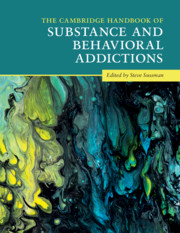
-
Select format
-
- Publisher:
- Cambridge University Press
- Publication date:
- July 2020
- August 2020
- ISBN:
- 9781108632591
- 9781108427166
- 9781108447850
- Dimensions:
- (279 x 216 mm)
- Weight & Pages:
- 1.41kg, 464 Pages
- Dimensions:
- (279 x 216 mm)
- Weight & Pages:
- 1.23kg, 464 Pages
You may already have access via personal or institutional login
Book description
Written by leaders in the addictions field, 100 authors from six countries, this handbook is a thoroughly comprehensive resource. Philosophical and legal issues are addressed, while conceptual underpinnings are provided through explanations of appetitive motivation, incentive sensitization, reward deficiency, and behavioral economics theories. Major clinical and research methods are clearly mapped out (e.g. MRI, behavioral economics, interview assessments, and qualitative approaches), outlining their strengths and weaknesses, giving the reader the tools needed to guide their research and practice aims. The etiology of addiction at various levels of analysis is discussed, including neurobiology, cognition, groups, culture, and environment, which simultaneously lays out the foundations and high-level discourse to serve both novice and expert researchers and clinicians. Importantly, the volume explores the prevention and treatment of such addictions as alcohol, tobacco, novel drugs, food, gambling, sex, work, shopping, the internet, and several seldom-investigated behaviors (e.g. love, tanning, or exercise).
Awards
Finalist, 2021 PROSE Award - Biological and Life Sciences Finalists, Nursing and Allied Health, Association of American Publishers
Contents
Metrics
Full text views
Full text views help Loading metrics...
Loading metrics...
* Views captured on Cambridge Core between #date#. This data will be updated every 24 hours.
Usage data cannot currently be displayed.
Accessibility standard: Unknown
Why this information is here
This section outlines the accessibility features of this content - including support for screen readers, full keyboard navigation and high-contrast display options. This may not be relevant for you.
Accessibility Information
Accessibility compliance for the PDF of this book is currently unknown and may be updated in the future.


